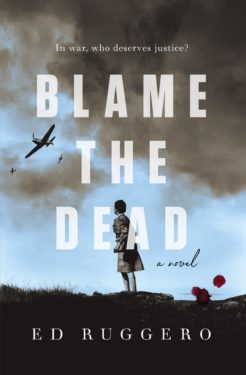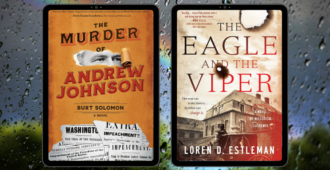In need of some advice to jump start your writing this year? Author Ed Ruggero suggests three activities that should be an aspect of every writer’s life: Read, Write, and Persevere. Read his advice below, and pre-order his newest novel Blame the Dead, an action-packed and compelling historical fiction set in World War II.
By Ed Ruggero
Read. I doubt you can be a writer unless you’re a reader. But piling up books on your night table isn’t enough; you must be an active reader. If you like something, ask yourself why you liked it. Parse it and try to figure out why it worked so well.
One of my favorite historians writing today is Rick Atkinson, whose prose is so beautiful it begs to be read aloud. When I run across a passage like that, I read it out loud in my normal speaking voice. Then I look at his choices: what verbs did he use? How did he vary the sentence structure? How did he pare it so the reader is only getting the absolute essentials? What did he repeat? Where are the surprises? Atkinson, in particular, is a bold writer, unafraid to use an unfamiliar word or even to break convention for dramatic effect, in the way that actors sometimes break the fourth wall and speak directly to the audience.
Atkinson spends the lengthy prologue of The Guns At Last Light painting a vivid picture of the coiled-spring energy of the Allied D-Day armada slicing through a dark Channel toward France. Thousands of ships and aircraft, hundreds of thousands of men with their millions of prayers.
Down the ten channels they plunged, two designated for each of the five forces steaming toward the five beaches: Utah, Omaha, Gold, Juno, Sword. Wakes braided and rebraided. The amber orb of a full moon rose through a thinning overcast off the port bow, and the sea sang as swells slipped along every hull bound for a better world. Hallelujah, sang the sea. Hallelujah. Hallelujah.
Look at the word choice and repetition (“braided and rebraided”). The moon is an “amber orb.” Look at the alliteration (“seas sang as swells”). And those “hallelujahs” are not the stuff of your eighth-grade history book. It all works, in a self-consciously artistic effect, because of the tension built up throughout the entire prologue.
Reading aloud is also a great way to discover an author’s voice, and paying attention to voice will help you discover your own. When you read dialogue or interior monologue, examine the patterns. Is this character a thinker? Does what she says align with what she means, or are there subtexts? Is she combative? Passive-aggressive? Mean? Sweet? Once you’ve identified some of those traits, look to see how the writer accomplished this. What word choice and sentence structure did the writer use to convey the character’s angst? Impatience? Worry? (Hint: with an accomplished author, it won’t be the character saying, “I’m worried.”)
Ken Follett, the hugely successful novelist, says you’ve got to care about words. You’ve got to be the kind of person who knows the difference between saying someone is “anxious” and saying someone is “eager.”
Write. Practice. The more you do it the better you become. Try different styles and even genres. Blog posts, journalism, thank you notes—it’s all helpful. Imitate writers whose work you admire; pick someone with a distinctive style. Stretch your muscles. When I taught composition years ago, we had the students write in imitation of Tom Wolfe in The Right Stuff. We did not want the students to adopt Wolfe’s distinctive voice forever and always, but in order to imitate you have to discover how the writer achieves that distinctive voice. You may adopt some aspects, or you may not, but you will have added to your toolkit.
Get a coach who is a careful reader and who will provide useful, detailed and actionable feedback. Heck, Itzhak Perlman has a coach. Serena Williams has a coach.
A good editor doesn’t say, “Here’s how I would do it.” A good editor says, “Given your talents, here’s a better way you could write it.” If you can get a couple of coaches, so much the better; you can compare their feedback.
Persevere. I read a story recently about a woman who went to her doctoral defense wearing a skirt made out of all the rejection letters she’d received from professional journals.
I’m never going to tell someone that if you try hard enough, anything is possible. I think that’s patently untrue—I was never going to play pro baseball—but unless you stick to it, I mean really work your butt off, you can’t honestly say, “I gave it my best shot but I just don’t have the goods.”
By the way, I love stories about artists who were rejected multiple times and came out on top. Dolly Parton was a struggling songwriter when Elvis said he wanted to record her song, “I Will Always Love You,” which would have been a huge, maybe career-making break for her. But when Elvis’s manager said they’d take a big cut of the royalties, she turned them down. She said she cried for weeks and worried that she’d squandered her big chance. She kept at it and, of course, had the last laugh.
Mario Puzo wrote a novel about the mafia and was told by multiple publishers that no one wanted to read about gangsters anymore. The novel was The Godfather. Andy Weir couldn’t get anyone interested in his book The Martian. Too nerdy and techy. He must have enjoyed going to the movie premiere and seeing the book, published with Matt Damon’s picture on the cover, fly off the shelves.
Pre-Order Your Copy:












